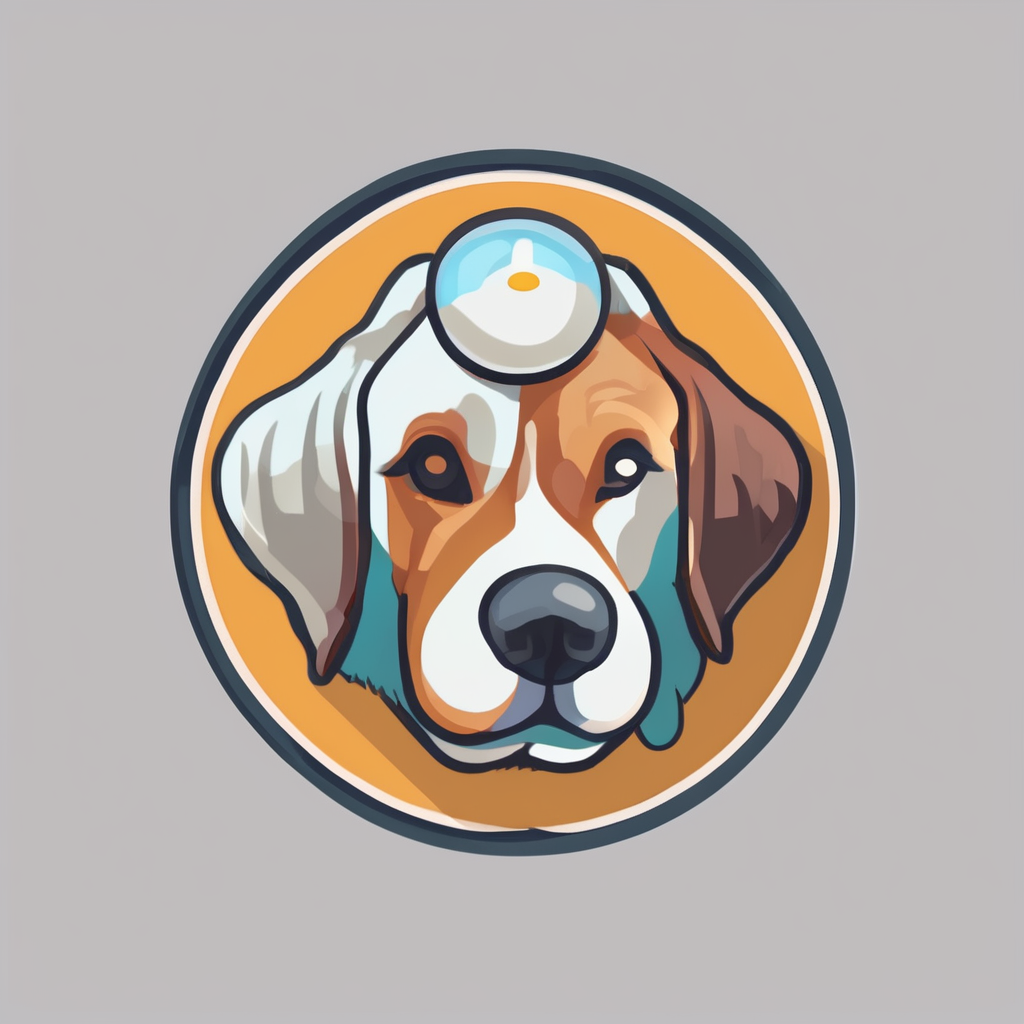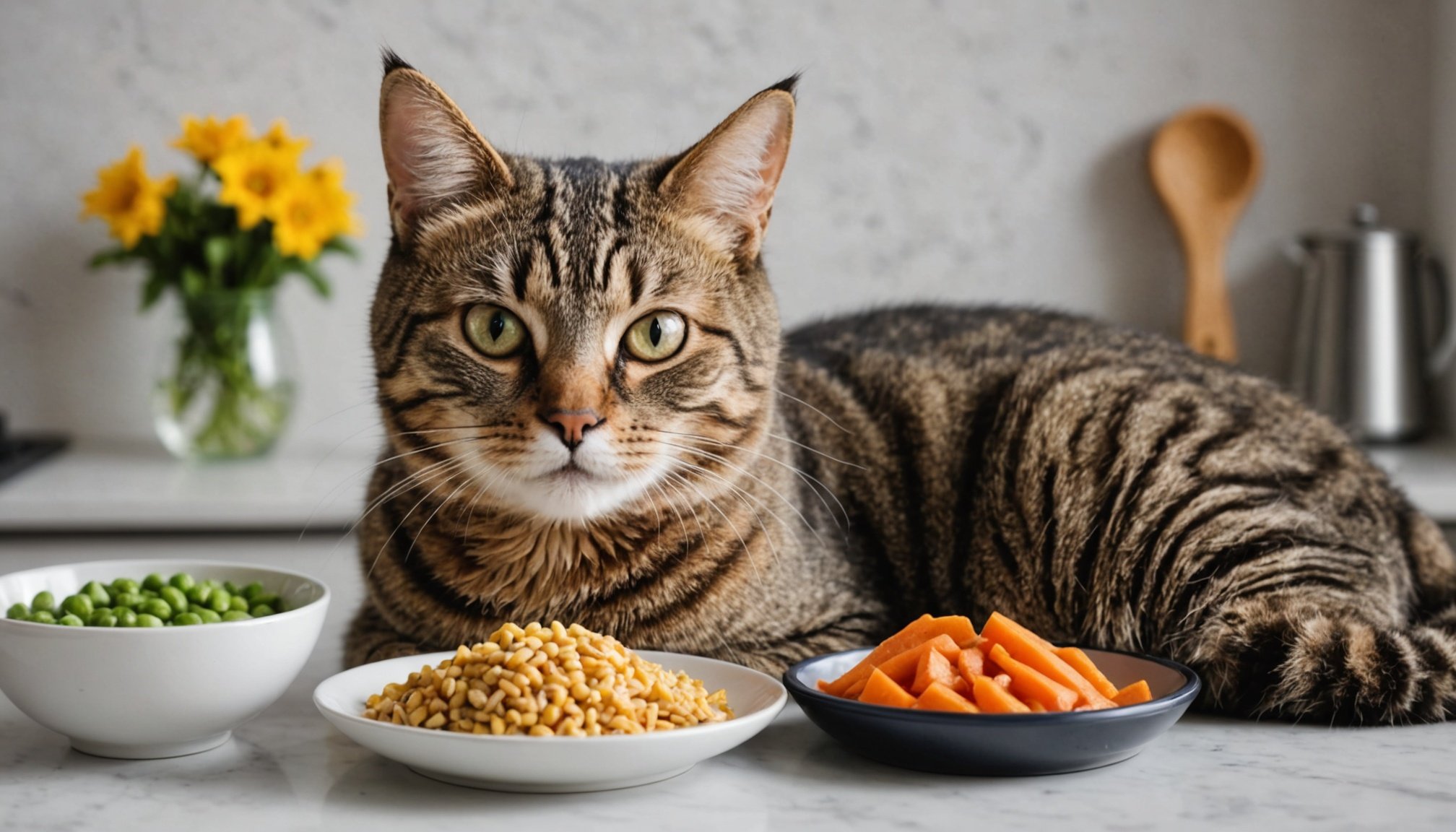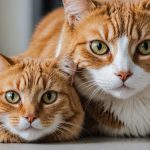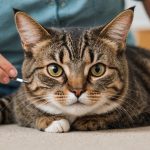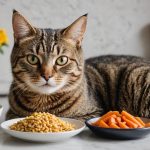Understanding Hyperthyroidism in Cats
Hyperthyroidism is a common endocrine disorder affecting cats, particularly the older feline population. This condition results from an overproduction of thyroid hormones, which can significantly impact a cat’s metabolism, often leading to notable changes in behaviour and health.
Symptoms of hyperthyroidism in cats can vary, but there are several key signs to watch for. These include increased appetite coupled with weight loss, hyperactivity, increased thirst, and frequent urination. Some cats may exhibit vomiting or diarrhoea, and a scruffy coat is another potential indication. Recognising these symptoms early is crucial for timely intervention.
En parallèle : Effortless tips for calming your cat during nail trimming sessions!
The diagnosis of hyperthyroidism requires professional veterinary consultation. A vet will typically begin with a thorough physical examination, looking for an enlarged thyroid gland and assessing the cat’s overall condition. Blood tests are critical in confirming hyperthyroidism, measuring the levels of thyroid hormones in the bloodstream. Further diagnostics might include imaging techniques, if needed, to assess the thyroid gland’s structure and function.
Prompt diagnosis and treatment of hyperthyroidism can greatly improve a cat’s quality of life, emphasising the importance of regular veterinary checks. Early detection and management are key in mitigating potential complications associated with this prevalent feline condition.
A lire également : Stress-free strategies for teaching your cat to tolerate nail clipping naturally and comfortably
Nutritional Needs of Hyperthyroid Cats
Hyperthyroid cats have unique dietary needs that require careful attention to ensure optimal health. Understanding these specific requirements is crucial for managing their condition effectively.
A balanced diet is vital for hyperthyroid cats to maintain their weight and manage symptoms. Due to an increased metabolism, they often require a higher caloric intake. Ensuring an appropriate macronutrient balance—particularly higher levels of protein and moderate fat content—is important to meet their energy demands. However, carbohydrates should be kept low to prevent excess calorie intake.
Essential vitamins and minerals play a significant role in managing hyperthyroidism. Nutrients such as iodine, selenium, and B vitamins are particularly important. Iodine supports thyroid hormone production, while selenium acts as an antioxidant, protecting thyroid tissues. B vitamins can support overall energy levels.
Incorporating these specific dietary requirements can help mitigate the effects of hyperthyroidism and improve a cat’s quality of life. Always consult with a veterinarian before making significant dietary changes to ensure all nutritional needs are met effectively. This approach will encourage healthy management and potentially alleviate some of the symptoms associated with this condition.
Effective Strategies for Weight Management
Managing one’s weight can often feel like a complex puzzle, but with the right strategies, it becomes more manageable. Weight management begins with understanding the importance of calorie control. To maintain or achieve a healthy weight, consider adopting a mindful approach to portion sizes. Serving meals on smaller plates, for instance, can trick the brain into feeling satisfied with less food.
Regularly monitoring weight enables you to make necessary dietary adjustments before habits solidify. This ongoing awareness is essential, as it helps maintain focus and encourages proactive behaviour in the face of fluctuations.
An effective strategy incorporates balanced, gradual changes rather than drastic cuts, ensuring health isn’t compromised. Aim for a slow and steady approach to weight loss by occasionally substituting high-calorie foods with nutritious, low-calorie alternatives.
Another critical element is setting realistic goals. Focus on achieving these through dietary modifications, combined with regular exercise. This method not only supports weight management but also fosters a sense of accomplishment, driving continued motivation.
By employing these thoughtful strategies to regulate portion sizes and maintain calorie control, you develop sustainable habits leading to long-term success without compromising overall health.
Enhancing Energy Levels with Nutrition
Modern life demands high energy levels, and the right nutrient-rich foods can provide a significant energy boost. Focusing on high-quality ingredients not only fuels your body but also helps maintain overall well-being. Let’s delve into the foods that keep your energy levels up without excess calories.
Complex carbohydrates like whole grains and legumes release energy gradually, preventing energy crashes often associated with refined carbohydrates. Adding enough fibre is crucial, as it slows sugar absorption, maintaining a steady energy flow. High-quality ingredients play a vital role in this process by offering sustained energy rather than quick, short-lived bursts.
Protein is indispensable for maintaining energy levels. It plays a key role in repairing tissues and producing neurotransmitters, which are critical for alertness and concentration. Sources like eggs and lean meats provide essential amino acids, further promoting energy production.
Including healthy fats is another way to ensure sustained energy. Omega-3 fatty acids, found in fish and nuts, support brain function and energy efficiency. Unlike unhealthy fats, these are metabolised slowly, providing lasting energy.
To effectively incorporate these tips, consider a balanced diet that remains rich in nutrients without unnecessary calories, laying the foundation for consistent energy throughout the day.
Suitable Ingredients for a Hyperthyroid Cat Diet
When developing a diet for a cat with hyperthyroidism, choosing the right ingredients is crucial. Foods rich in protein are essential for maintaining muscle mass, so lean meats such as chicken or turkey make excellent choices. Healthy fats, like those found in fish oil, provide necessary omega-3 fatty acids, which can support a cat’s overall health. Consider including fibre-rich vegetables like peas, as they offer nutrient diversity without unnecessary calories.
It’s essential to avoid foods high in iodine, as these can exacerbate the condition. Common culprits include seafood and dairy products. Preservatives and artificial additives should be skipped, as they may trigger adverse reactions or upset.
For homemade recipes, simplicity is key. A basic meal might include cooked chicken, a small portion of brown rice, and mashed butternut squash, all in appropriate ratios. Ensure that any homemade meal meets the vitamin requirements by consulting a vet or nutritionist.
Providing a well-structured diet tailored to the unique needs of a hyperthyroid cat assists in managing symptoms and improving quality of life. Choices focused on balance, nutrition, and health go a long way in supporting these furry companions.
Veterinary Advice and Supplement Options
Maintaining your pet’s health is crucial, and veterinary guidance can play an essential role in achieving this. Regular check-ups with your vet ensure that any necessary dietary adjustments are made promptly. This proactive approach helps in monitoring your pet’s thyroid health, ensuring any concerns are addressed early.
When it comes to supplements, they can be beneficial in supporting your pet’s thyroid health. Commonly recommended options include Omega-3 fatty acids, known for their anti-inflammatory properties, and L-carnitine, which aids in energy production. Supplementation should always be guided by a vet, as dosages need careful management.
To effectively monitor your pet’s health, look out for indicators like changes in weight, appetite, and energy levels. These can be crucial signals for health adjustments and should prompt a visit to the vet for further evaluation. Regular blood tests are also part of a comprehensive health monitoring plan, providing insights into thyroid function and overall health.
Engaging with your veterinary guidance continuously and discussing supplement options ensures your pet’s dietary plan remains optimal. This collaboration fosters a healthy life for your four-legged companion.
Recipes and Meal Planning
Meal planning is essential for the dietary management of hyperthyroid cats. With a thoughtfully crafted feeding schedule, you can better regulate their energy levels. Sample meal plans are a practical way to ensure that these cats receive the right balance of nutrients. It’s crucial to focus on high-quality proteins and low-iodine ingredients.
Recipes for nutritious meals involve using fresh, whole foods. For example, a meal of boiled chicken, a small portion of pumpkin, and brown rice can be both delicious and beneficial. Incorporating such recipes ensures that your cat’s dietary needs are met without compromising taste.
Creating a feeding schedule can help stabilize a cat’s energy levels. This involves splitting meals into smaller portions and serving them throughout the day. By doing so, a steady release of energy can be maintained, which is essential for hyperthyroid cats often prone to hyperactivity.
Consider simple guidelines:
- Serve meals at the same times daily.
- Monitor your cat’s response to adjust the meal plan if needed.
- Prioritize consistency to support your cat’s metabolism.
By following these tailored meal plans, recipes, and schedules, owners can significantly improve their cats’ overall health.
Monitoring Health and Dietary Adjustments
For pet owners, consistent health monitoring of hyperthyroid cats is crucial to ensure effective management and well-being. Keeping a close eye on any significant changes in your cat’s weight and behavior can provide early indicators of issues or improvements that need to be addressed. Regularly tracking these factors allows for timely diet adjustments and can prevent potential health complications.
If fluctuations in weight or unusual behaviors are observed, it may be necessary to revisit the dietary plans. Regular consultations with your vet are recommended, as professional guidance ensures any modifications are effective and non-detrimental. Vets can also suggest advanced ongoing care techniques tailored specifically to your feline’s condition.
Long-Term Management Strategies
Implementing long-term management strategies is vital in dealing with hyperthyroid cats. These strategies could include consistent vet check-ups, medication regimens, and personalized diet adjustments. Through careful monitoring and professional advice, pet owners can significantly enhance their cat’s quality of life. Remember, proactive health management not only benefits your pet’s ongoing care, but also provides peace of mind knowing that their needs are thoroughly addressed.
